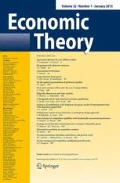Abstract
This paper analyzes the outcomes that can be supported by social norms in a society of infinitely lived and patient agents that are randomly matched in pairs every period to play a given game. I find that any mutually beneficial outcome can be supported by a self-enforcing social norm under both perfect information and a simple local information system. These Folk Theorem results explain not only how social norms can provide incentives that support cooperation in a community, providing support to the concepts of social capital and corporate culture, but also how they can support inequality and discrimination.
Similar content being viewed by others
References
Abreu D., Dutta P.K., Smith L. (1994). The folk theorem for repeated games: a NEU condition. Econometrica 62:939–948
Akerlof G. (1976). The economics of caste and of the rat race and other woeful tales. Quart J Econ 90:599–617
Arrow K. (1973). The theory of discrimination. In: Ashenfelter O., Rees A (eds). Discrimination in labor markets. Princeton University Press, Princeton
Aumann, R., Shapley, L.: Long term competition: a game theoretic analysis. Mimeo (1976)
Axelrod R. (1984). The evolution of cooperation. Basic Books, New York
Baker G., Gibbons R., Murphy K.J. (1994). Subjective performance measures in optimal incentive contracts. Quart J Econ 109: 1125–1156
Baker G., Gibbons R., Murphy K.J. (2002). Relational contracts and the theory of the firm. Quart J Econ 117:39–84
Becker G. (1959). The economics of discrimination. University of Chicago Press, Chicago
Bull C. (1987). The existence of self-enforcing implicit contracts. Quart J Econ 102:147–159
Coleman J. (1990). Foundations of social theory. Harvard University Press, Cambridge
Crémer J. (1986). Cooperation in ongoing organizations. Quart J Econ 101:33–49
Ellison G. (1994). Cooperation in the prisoner’s dilemma with anonymous random matching. Rev Econ Stud 61:567–588
Friedman J.W. (1971). A non-cooperative equilibrium for supergames. Rev Econ Stud 38:1–12
Fudenberg D., Levine D.K., Maskin E. (1992). The folk theorem with imperfect information. Econometrica 62:997–1039
Fudenberg D., Maskin E. (1986). The folk theorem in repeated games with discounting or with incomplete information. Econometrica 54:533–554
Greif A. (1993). Contract enforceability and economic institutions in early trade – the Maghribi traders coalition. Am Econ Rev 83:525–548
Greif A., Milgrom P., Weingast B. (1994). Coordination, Commitment, and Enforcement - the case of the merchant guild. J. Polit. Econ. 102:745–776
Huck, S., Kübler, D., Weibull, J.W.: Social norms and optimal incentives in firms. Mimeo (2001)
Kandel E., Lazear E.P. (1992). Peer pressure and partnerships. J. Polit. Econ. 100:801–817
Kandori M. (1992). Social norms and community enforcement. Rev Econ Stud 59:63–80
Kreps D.M., Wilson R. (1982). Sequential equilibrium. Econometrica 50:863–894
Loury G. (1977). A dynamic theory of racial income differences. In Wallce P.A., Le Mund A (eds). Women, minorities, and employment discrimination. Lexington Books, Lexington, MA
Luce R.D., Raiffa H. (1957). Games and decisions. Wiley, New York
MacLeod W.B., Malcomson J.M. (1989). Implicit contracts, incentive compatibility, and involuntary unemployment. Econometrica 57:447–80
Okuno-Fujiwara M., Postlewaite A. (1995). Social norms and random matching games. Games Econ. Behav. 9:79–109
Rob R., Zemsky P. (2002). Social capital, corporate culture, and incentive intensity. RAND J. Econ. 33:243–257
Author information
Authors and Affiliations
Corresponding author
Additional information
I am grateful to David Levine for invaluable guidance and ideas. I also thank Anna Aizer, Hongbin Cai, Walter Cont, Ernesto Dal Bó, Jean-Laurent Rosenthal, Federico Weinschelbaun, William Zame, anonymous referees and seminar participants at Universidad de Buenos Aires, UCLA, Universidad T. Di Tella, Harvard Business School and Stockholm School of Economics for very useful comments and discussions
Rights and permissions
About this article
Cite this article
Bó, P.D. Social norms, cooperation and inequality. Economic Theory 30, 89–105 (2007). https://doi.org/10.1007/s00199-005-0045-7
Received:
Accepted:
Published:
Issue Date:
DOI: https://doi.org/10.1007/s00199-005-0045-7




